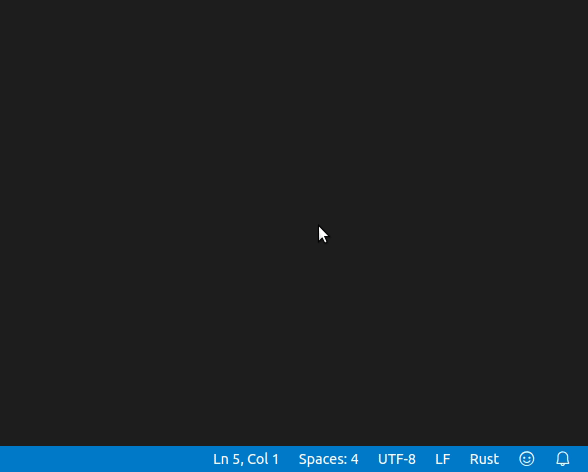3072: vscode: removed unnecessary awaits feature r=matklad a=Veetaha
Found a feature that when the user has no internet connection the whole extension is blocked by waiting for the user to dismiss the error message and for making a sanity-check dns resolution.
Co-authored-by: Veetaha <gerzoh1@gmail.com>
3071: Freshen docs for prebuilt binaries and raLspServer setting r=matklad a=Veetaha
Better documented breaking changes as per an incident in #2988
Follow up for #3053
Co-authored-by: Veetaha <gerzoh1@gmail.com>
3068: Do not import anything if first segment of the qualified path resolves r=matklad a=SomeoneToIgnore
Part of initial https://github.com/rust-analyzer/rust-analyzer/pull/3061, closing 2nd issue mentioned in the last comment there.
Co-authored-by: Kirill Bulatov <mail4score@gmail.com>
3053: Feature: downloading lsp server from GitHub r=matklad a=Veetaha
This is currently very WIP, I may need to change this and that, add "download language server command", logging stuff (for future bug reports), etc., but it already works.
Also didn't test this on windows yet and mac (don't have the latter)
The quirks:
* Downloaded binary doesn't have executable permissions by default, that's why we ~~`chmod 111`~~ (**[UPD]** `chmod 755` as per @lnicola [suggestion](https://github.com/rust-analyzer/rust-analyzer/pull/3053#discussion_r376694456)) for it.
* To remove installed binary run `rm /${HOME}/.config/Code/User/globalStorage/matklad.rust-analyzer/ra_lsp_server-linux`, ~~note that `-f` flag is necessary, because of `111` permissions (I think this should be changed)~~ (**[UPD]** --force is no longer needed due to 755 permissions).
I also tried to keep things simple and not to use too many dependencies, all the ones added have 0 dependencies, (`ts-not-nil` is my personal npm package, that imitates `unwrap()` in TypeScript)
**[UPD]** I reduced throttle latency of progress indicator to 200ms for smoother UX
// TODO:
- [x] ~~Add `Rust Analyzer: Download latest language server` vscode command.~~ **[UPD]**: having reviewed the code and estimated available options I concluded that this feature requires too many code changes, I'd like to extract this into a separate PR after we merge this one.
- [x] Add some logging for future debugging
- [x] ~~Gracefully handle the case when language server is not available (e.g. no internet connection, user explicitly rejected the download, etc.)~~ **[UPD]** Decided to postpone better implementation of graceful degradation logic as per [conversation](https://rust-lang.zulipchat.com/#narrow/stream/185405-t-compiler.2Fwg-rls-2.2E0/topic/Deployment.20and.20installation/near/187758550).
Demo (**[UPD]** this is a bit outdated, but still mainly reflects the feature):

Related issue: #2988#3007
Co-authored-by: Veetaha <gerzoh1@gmail.com>
Co-authored-by: Veetaha <veetaha2@gmail.com>
3069: Simplify Assists interface r=matklad a=matklad
Instead of building a physical tree structure, just tag related
assists with the same group
Co-authored-by: Aleksey Kladov <aleksey.kladov@gmail.com>
3066: Some README fixes/cleanups r=matklad a=flodiebold
Make capitalization more consistent and fix some typos.
Co-authored-by: Florian Diebold <flodiebold@gmail.com>
3050: Refactor type parameters, implement argument position impl trait r=matklad a=flodiebold
I wanted to implement APIT by lowering to type parameters because we need to do that anyway for correctness and don't need Chalk support for it; this grew into some more wide-ranging refactoring of how type parameters are handled 😅
- use Ty::Bound instead of Ty::Param to represent polymorphism, and explicitly
count binders. This gets us closer to Chalk's way of doing things, and means
that we now only use Param as a placeholder for an unknown type, e.g. within
a generic function. I.e. we're never using Param in a situation where we want
to substitute it, and the method to do that is gone; `subst` now always works
on bound variables. (This changes how the types of generic functions print;
previously, you'd get something like `fn identity<i32>(T) -> T`, but now we
display the substituted signature `fn identity<i32>(i32) -> i32`, which I think
makes more sense.)
- once we do this, it's more natural to represent `Param` by a globally unique
ID; the use of indices was mostly to make substituting easier. This also
means we fix the bug where `Param` loses its name when going through Chalk.
- I would actually like to rename `Param` to `Placeholder` to better reflect its use and
get closer to Chalk, but I'll leave that to a follow-up.
- introduce a context for type lowering, to allow lowering `impl Trait` to
different things depending on where we are. And since we have that, we can
also lower type parameters directly to variables instead of placeholders.
Also, we'll be able to use this later to collect diagnostics.
- implement argument position impl trait by lowering it to type parameters.
I've realized that this is necessary to correctly implement it; e.g. consider
`fn foo(impl Display) -> impl Something`. It's observable that the return
type of e.g. `foo(1u32)` unifies with itself, but doesn't unify with e.g.
`foo(1i32)`; so the return type needs to be parameterized by the argument
type.
This fixes a few bugs as well:
- type parameters 'losing' their name when they go through Chalk, as mentioned
above (i.e. getting `[missing name]` somewhere)
- impl trait not being considered as implementing the super traits (very
noticeable for the `db` in RA)
- the fact that argument impl trait was only turned into variables when the
function got called caused type mismatches when the function was used as a
value (fixes a few type mismatches in RA)
The one thing I'm not so happy with here is how we're lowering `impl Trait` types to variables; since `TypeRef`s don't have an identity currently, we just count how many of them we have seen while going through the function signature. That's quite fragile though, since we have to do it while desugaring generics and while lowering the type signature, and in the exact same order in both cases. We could consider either giving only `TypeRef::ImplTrait` a local id, or maybe just giving all `TypeRef`s an identity after all (we talked about this before)...
Follow-up tasks:
- handle return position impl trait; we basically need to create a variable and some trait obligations for that variable
- rename `Param` to `Placeholder`
Co-authored-by: Florian Diebold <florian.diebold@freiheit.com>
Co-authored-by: Florian Diebold <flodiebold@gmail.com>
3063: Remove hard-coded auto-import during completion r=matklad a=matklad
We now have a real auto-import system, so we can do a proper thing.
Co-authored-by: Aleksey Kladov <aleksey.kladov@gmail.com>